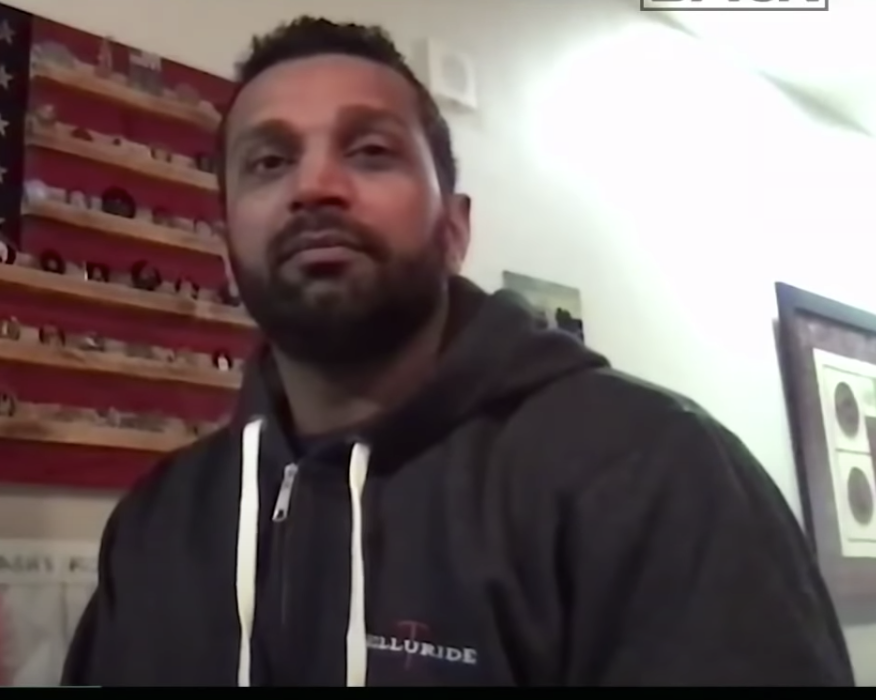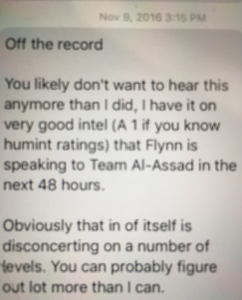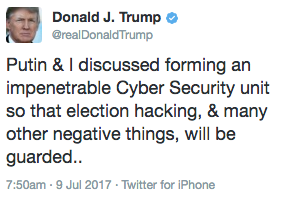Two One-Time Devin Nunes Flunkies Under Investigation for Leaks
Michael Ellis, the Devin Nunes flunky who had been installed as NSA General Counsel over more qualified people, resigned from NSA after being placed on leave since Inauguration Day. I hadn’t realized until I read Ellen Nakashima’s report on Ellis’ resignation that he was being investigated for leaking classified information, though Catherine Herridge reported that investigation in real time, the very same day that Ellis’ attorney wrote NSA inquiring about the investigation.
Meanwhile, a long David Ignatius profile of another Nunes flunky, Kash Patel, mentions that he, too, is under investigation for leaking classified information.
Patel repeatedly pressed intelligence agencies to release secrets that, in his view, showed that the president was being persecuted unfairly by critics. Ironically, he is now facing Justice Department investigation for possible improper disclosure of classified information, according to two knowledgeable sources who requested anonymity because of the sensitivity of the probe. The sources said the investigation resulted from a complaint made this year by an intelligence agency, but wouldn’t provide additional details.
Both of these men (along with a third Nunes flunky, Derek Harvey) have been a real threat to national security and both have a history of writing crappy reports for Nunes (recent reporting reminds that Ellis was the author of an unnecessarily shitty Edward Snowden report, for example). There’s little doubt they have released the kinds of material that have never before been released, but much of that would either be legal and/or protected by Speech and Debate.
But the fact that both are being investigated for leaking classified information raises questions whether leak investigations are just being used as an easy way to take out intelligence community critics, whether they’re both suspected of leaking the same information, or whether there’s more there.
The Ignatius story, in particular, is of interest, not least because he’s the guy who first reported Mike Flynn’s conversation with Sergey Kislyak in a seemingly sanctioned leak, making this report a kind of book-end to the Trump Administration. All the more so given that Ignatius not only notes the sensitivity of the probe into Patel, but then tells a story that likely relies on classified information of how Patel’s incompetence almost blew up a SEAL rescue mission in Niger.
Anger toward Patel within the national security bureaucracy mounted after an Oct. 31, 2020, hostage rescue mission in Nigeria. The incident, never previously reported in detail, was described by four high-level sources.
It was a rescue mission that was nearly aborted partly because of inadequate coordination by Patel. SEAL Team Six had been assigned to rescue 27-year-old Philip Walton, a missionary’s son who had been kidnapped by gunmen in Niger, near the border with Nigeria. Patel, as a senior counterterrorism adviser, had assured colleagues that the mission had a green light, according to several sources. The SEALs were ready to parachute into the rescue site from high altitude (one source estimated 30,000 feet) when there was a last-minute hitch.
But as the SEALs were about to jump, military commanders and State Department officials realized that one necessary item hadn’t been completed: The Nigerian government hadn’t been informed prior to the operation inside their country, as required.
A frantic last-minute effort to obtain the necessary permission ensued. The SEAL team’s aircraft held over the target, flying in a racetrack pattern, for about 45 minutes while the State Department tried to locate a Nigerian national security official who could receive the official notice. Finally, just 15 minutes before the operational window closed, the Nigerians were given word, the SEALs parachuted down, and the hostage was rescued.
Secretary of State Mike Pompeo and Gen. Mark A. Milley, chairman of the Joint Chiefs of Staff, were angry that, in their view, Patel had prematurely said the operation was fully cleared, according to knowledgeable officials. One senior Pentagon official said he was “incensed” at Patel. A second senior Pentagon official described Patel’s actions as potentially “dangerous” for the SEALs.
The attack on Patel’s role in the hostage rescue may be a signal about what Patel is suspected of leaking.
While Ignatius provides no indication of what Patel is suspected of leaking, the WaPo columnist does link to an interview Patel did with Aaron Maté. The interview is about what you’d expect from a propagandist interviewing a propagandist. Patel makes a slew of false claims that Maté encourages: the purpose of FISA, what normally goes in FISA applications, the intelligence against Carter Page, what servers the FBI obtained as part of its investigation into the hack (Maté still ascribes the single server fallacy!), what Crowdstrike actually had access to, what Bruce Ohr’s FBI interviews actually showed. Perhaps the most hysterical part of the interview is where Patel claimed that the way to conduct an investigation is to follow the money, but Maté never asked him why HPSCI didn’t follow the money on a single Trump associate, to say nothing of Trump’s role in money laundering for Russian oligarchs.
Nevertheless, in their discussion about the Russian investigation, Patel was quite careful to avoid revealing non-public information, not even for a report he authored claiming poor tradecraft on the Intelligence Community Assessment of the Russian attack that both SSCI and John Durham have investigated and dismissed.
Maté similarly let Patel dodge really answering questions about his conduct on January 6, even though some of the biggest questions about that day pertain to why DOD delayed for three hours before reinforcing the Capitol, including why it took over 30 minutes for an order to deploy to get from Acting Secretary of Defense Christopher Miller to Guard Commander General William Walker who had been waiting on stand-by. In response to Maté’s question, Patel first repeated his selective breach of Executive Privilege to claim that Trump had already authorized Guard deployments, then answered a totally different question than the one Maté asked — not why DOD let the attack continue for 3 hours, long after it had gotten repeated requests for help, but how quickly DOD deployed the Guard after they had allowed an attack to happen across town while they watched.
We activated, from a start, the fastest augmentation and mobilization of uniformed military troops in the DC area since World War II, and we put 24,000 boots on the ground in less than 48 hours. I don’t know who’s saying we slow-rolled anything, because these are Guardsmen, they’re not active duty military.
While Patel violated Executive Privilege, there’s nothing classified about the belated Guard deployment.
It’s in-between those two conversations, though, where Patel may have succumbed to Maté’s persistent questioning about the very same topic about which Ignatius’ sources attack Patal: hostage rescues. Maté asked about a report that Patel had tried to negotiate the release of Austin Tice. Patel first responded to Maté by saying that he wouldn’t address whether Tice is alive or not. But then Maté followed up, and Patel told a self-serving story about his role in an attempt to free Tice. In it, Patel provided non-public details about his meeting with Assad representatives in Syria and may have confirmed an intercept on Bashar al-Assad.
Maté: Can you tell us anything about your discussions with Syrian officials, what they were asking from you, their level of openness to having talks with the US government?
Patel: Sure, I mean, look, that didn’t happen overnight. You know, one of President Trump’s priorities was, “go get American hostages home,” and I think we got over 50 — 53ish, hostages, detainees back — from 20-some countries maybe. Maybe a little less. But Austin Tice had been missing for, going on eight years, and we had made no headway, really, on it, so we made it a priority. We started working with our counterparts in the region. That trip was almost 18 months in the making. And we finally were able to land a meeting in Damascus because I told them, I said, “I’ll come see you. You send someone who can represent President Assad directly, because I can represent President Trump directly on this matter. And let’s go sit down.” And they said, “okay, come to Damascus.” And I don’t know if they thought we would show up or not. We did. And we were very clear. We said, “look, I understand I’m not getting Austin home on this trip, but I would like a proof of life. What would you like in return for that?” We had very frank conversations. They said, we want X amount of movement for the United States military. Troops stuff, and this and that. And I said, “look, all of that’s on the table. We can discuss all those things. I need a proof of life.” And they said they would take it back to Assad. Which they did. I know they did that. And then, I think shortly thereafter, I switched over to the Department of Defense, and tried to continue that mission, but, um, that one was one I just, unfortunately, didn’t succeed on. [my emphasis]
The most likely way that Patel would come to learn, with certainty, that whatever go-betweens he met with in Damascus actually did report back to Assad would be via an NSA or CIA intercept. If that is how he learned, then confirming that he knew Assad got a report back might have burned the intercept. Doing so with Maté at the Grayzone, which personally and as an outlet produce a lot of Assad apology, might be particularly sensitive. And the ease with which Maté appealed to Patel’s ego to get him to reveal these details would raise real questions about whether Patel played a role in the earlier WSJ story about the meeting, which was published on October 18, days before Patel almost fucked up the October 31 Niger mission.
That is, this Ignatius story seems like an effort to undermine Patel’s self-interested stories of heroism on hostage rescues, after he disclosed non-public details about one of them.
Which would also suggest that, whatever the merit of the investigation into Ellis (and I think GOP concerns about it have some merit), the investigation into Patel may be substantive.








